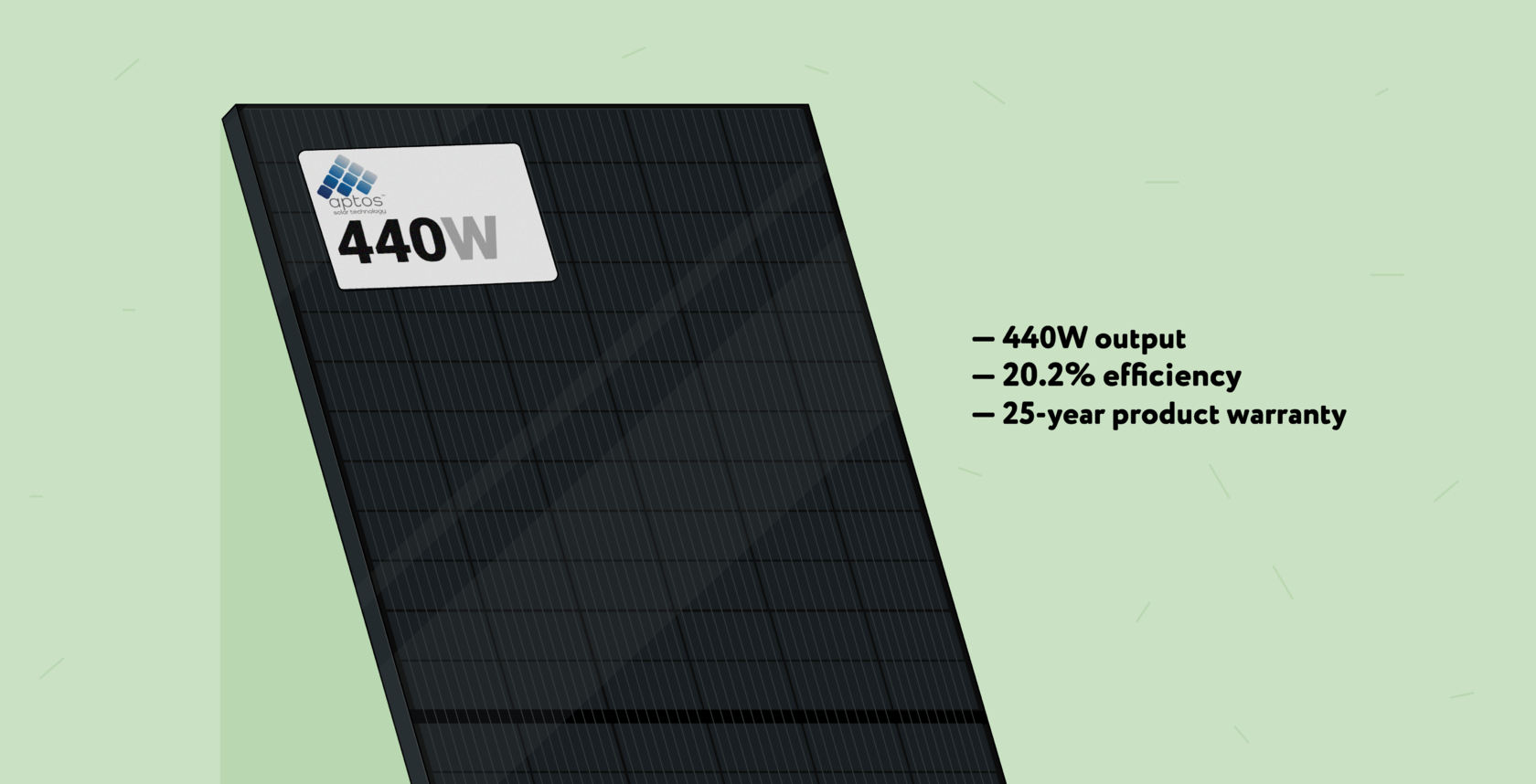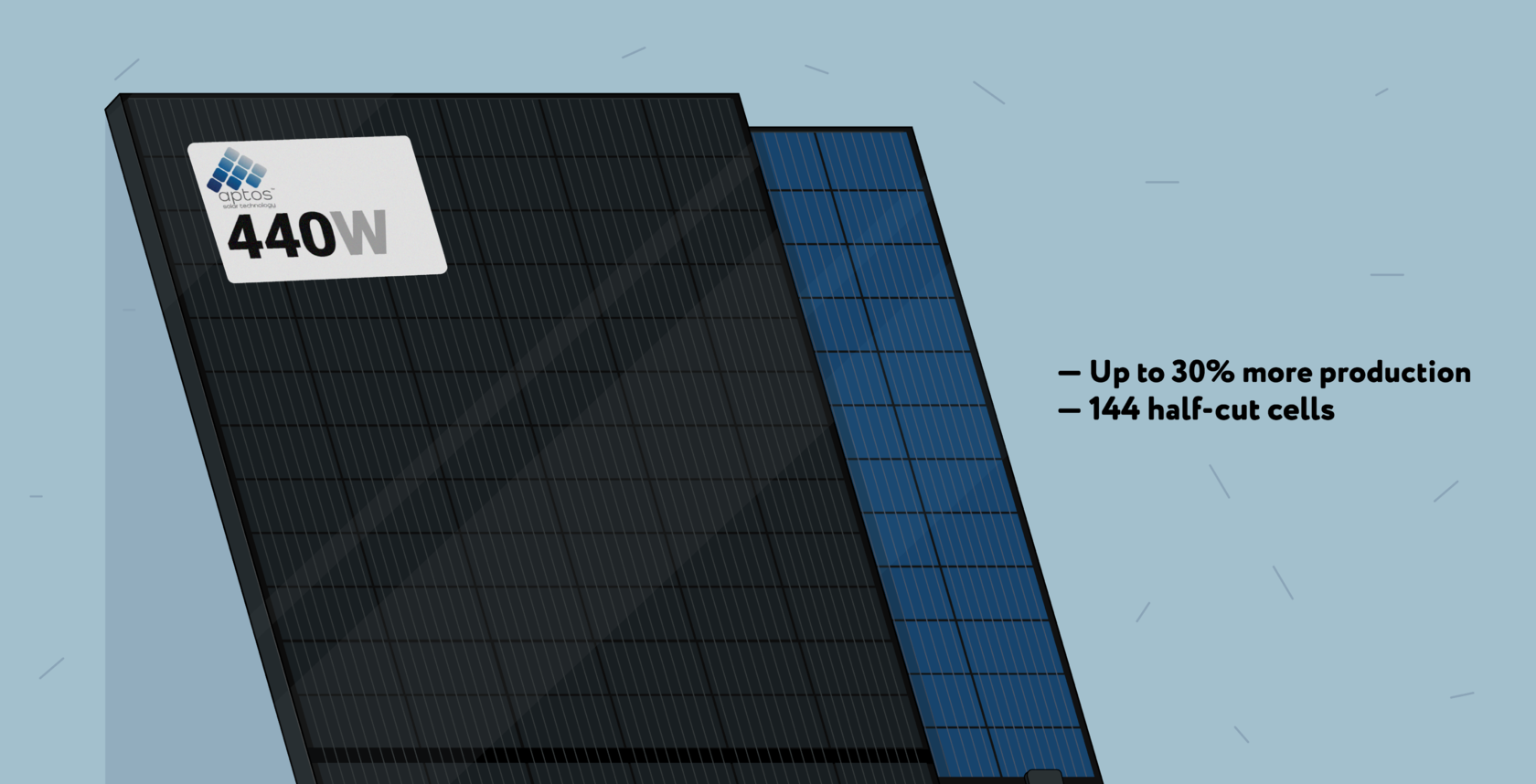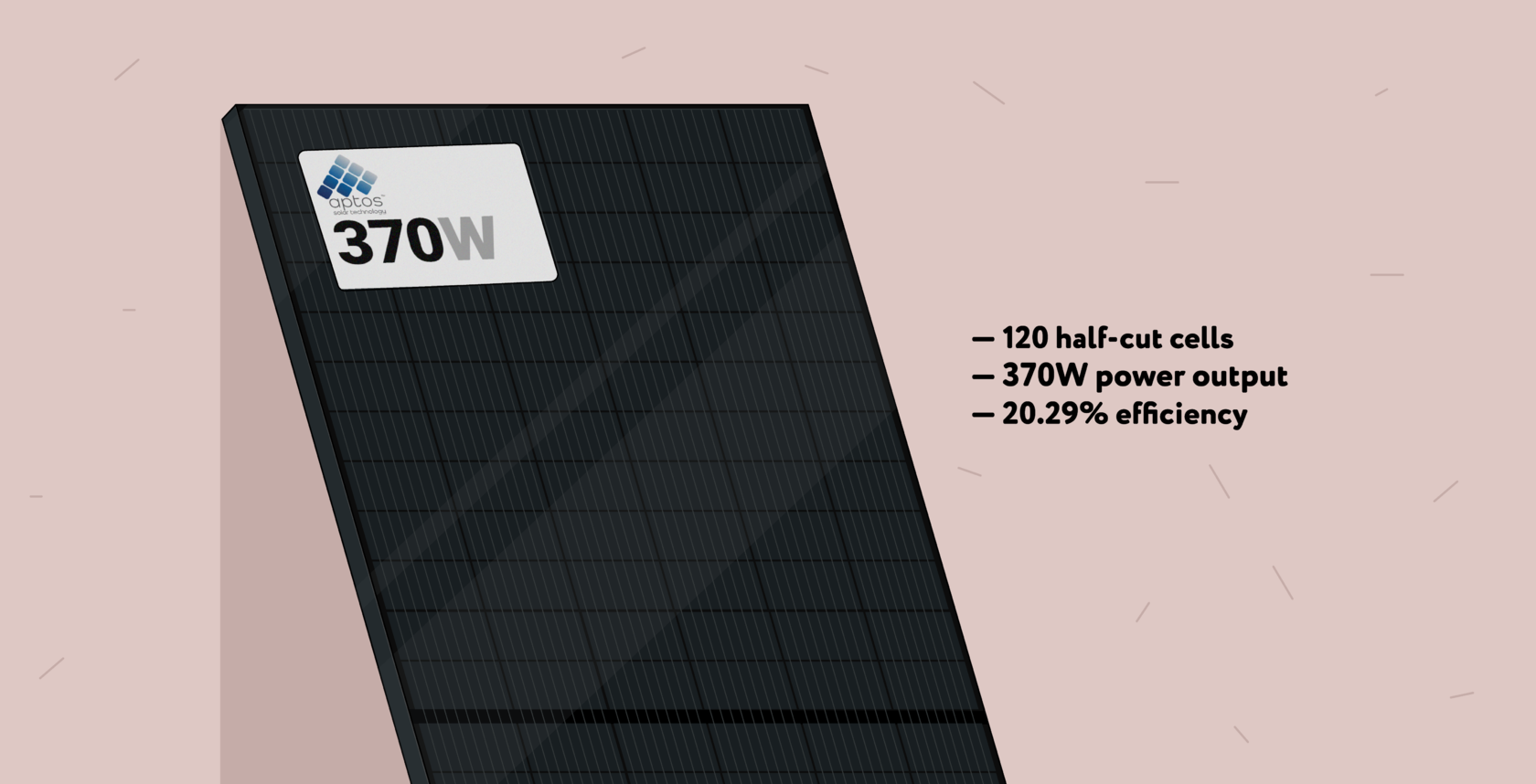Businesses can take a long time to boot and stabilize. Often a company that is 10 years old is called “young”. Aptos Solar, an American PV modules manufacturer, has been on the market for only 2-3 years, but its product is already high-quality and competitive. It’s exciting to see new blood on the scene but we aren’t going to cut the company any slack while examining its panels. Here comes our Aptos solar panels review.
DNA technology makes panels cheaper and more heat-resistant

Aptos engineering team uses a patented technology called Dual Nano absorber (DNA). It makes Aptos Solar panels stand out on the market for 3 reasons: DNA solar cells are cheaper to produce, they have more active surface and are more tolerant to high temperatures.
First of all, Aptos engineers stopped clipping corners of solar cells. It gave their panels an additional 5% of active surface that participates in converting sunlight to energy. They have also made busbars – copper ribbons that connect cells together – as thin as possible so they don’t overlap the cells.
What is more, the whole structure of a solar cell was revised. Engineers have added intrinsic layers of negatively charged atoms which increased the photon capture. Aptos team claims that they took the best from PERC and bifacial cell technologies to create their own innovation.
Aptos Solar: Commitment to quality
19.1%-20.6%
efficiency of Aptos panels
Aptos Solar engineers have managed to increase the efficiency of their panels by implementing DNA cell technology. Busbars in Aptos are thinner therefore they don’t take as much space from the solar cells. PV cells themselves are uncut which also contributes to increasing the active area of a panel. In the end the conversion rate of Aptos panels ranges from 19% to 20.6%: slightly better than average numbers on the market, but nothing too special. The panels provide a good power output though and that’s what matters more.
$0.7-$0.9
per watt
Aptos panels come at $0.7-$0.9 per watt – not too cheap, not really expensive. The use of DNA cell technology specifically allowed engineers to drive manufacturing costs down. As a result, Aptos solar panels prices are on par with other American manufacturers, like Mission Solar or Silfab.
Aptos Solar certainly makes sure that the product that they put on the market is high quality. To ensure that, they devised 3X IEC Standard quality testing. Basically, the panels undergo tests that are three times stricter than the baseline standards set by the International Electrotechnical Commission (IEC). Each module has to be able to withstand:
• Thermal cycling: the modules are continuously cycled between 185°F and -40°F. IEC baseline – 200 cycles, Aptos standard – 600.
• Humidity freeze: modules pass through the same temperature range, but this time with humidity changing from 85% at 185°F to no humidity control at -40°F. Aptos engineers set the testing baseline at 30 cycles instead of standard 10.
• Damp heat: solar panels spend 3,000 hours at 185°F with 85% humidity.
<0.01%
failure rate
As a result, the failure rate of Aptos Solar panels is less than 0.01%. Renewable Energy Testing Center (RETC) has partnered with Aptos to provide third-party testing.
To prove high quality of its product, Aptos Solar backs up their panel with a 25-year product warranty and 30-year performance warranty. These are among the best numbers in the industry, matching Silfab and offering even a bit more than Panasonic. The degradation rate of American panels is above average: panels retain over 85% after 25 years and over 82.4% after 30 years.
It’s no surprise that Aptos solar panels are well-prepared for any kind of extreme weather conditions. They are able to withstand 6,200 Pa wind loads, 5400 Pa snow loads and hail balls that are up to 1 inch in diameter. Panels resist salt mist and ammonia corrosion well. At the same time, hot and arid climates aren’t a threat to Aptos panels either.
While the DNA cell technology should increase the performance of Aptos panels at high temperatures, the exact improvement is hard to evaluate. The temperature coefficient which shows the effect of high temperatures on the production is around -0.36%/°C. It means the module loses 0.36% of its power for every degree above Normal Operating Cell Temperature, which is 44°C in this case. Temperature coefficient looks average at best and all-black panels, which Aptos Solar offers, usually heat up a little faster than standard modules.
Aptos Solar: pros
We’ve looked at specifications of Aptos Solar PV modules closely. Now let’s list down their strong and weak sides separately. Let’s start with what’s good:
• High quality. Strict quality standards and third-party testing ensure high quality of Aptos Solar panels. They are sturdy, reliable and suitable for all kinds of climates.
• Strong warranties. 25-year product warranty and 30-year performance warranty is not something you see everyday. These numbers show that Aptos Solar is confident in the product that it puts out on the market.
• Good design. Aptos Solar panels feature all-black design without any excessive silver bussing or ribbons.
Aptos Solar: cons
As you can see, Aptos Solar already gives a good impression. However, not mentioning the weak points about the brand wouldn’t be right. Here they here:
• Small product line. So far Aptos basically has two panels in different variations. The brand has started the operations only recently so hopefully we’ll see progress in that direction later.
• Young brand. Aptos Solar is only 2-3 years old. These early years can be harsh, so Aptos Solar panels can be hard to come by and providing warranty support may take longer.
Aptos solar panels overview: For home and business
Now that we’ve looked at the advantages and disadvantages of Aptos Solar product, it’s time to discuss the actual panels. So far Aptos Solar offers two models plus the variations. As usual, our engineer will take a look at the panels and say what he thinks.
Apart from solar panels, Aptos also offers microinverters!
DNA-120 Bifacial – More power with a smaller system

DNA-120 Bifacial is a variation of a standard DNA-120 panel for residential installations from Aptos Solar. It’s bifacial which means that both sides generate energy under the sunlight. The exact bonus that you get depends on the reflectivity of a surface or so called surface albedo. With the right setup you get up to 30% more production than with a standard monofacial panel. The panel is designed beautifully and half-cut cell design provides extra shading tolerance.
DNA-144 – Your solar partner

This all-black module from Aptos Solar is designed primarily for commercial systems, small and large. It provides 440W in output with up to 20.2% efficiency. Ultra-thin busbars ensure great cell connection inside a panel, but don’t affect the appearance. Half-cut cell design makes the panel more shading-resistant and durable. The panel is ready for all kinds of harsh weather and can withstand up to 5,400 Pa snow load and 6,200 Pa wind load. Add to that amazing 25/30-year warranties for product and performance and you have just a solid solar panel all around. The panel is available with a silver frame as well.
DNA-144 Bifacial – Going for maximum power

This is the same DNA-144, but now with two active sides. The rear side can add up to 30% more production. Bifacial panels are quite popular in commercial and industrial installations when you want to squeeze as much power from the space that is available to you.
A1 SolarStore recommends Aptos Solar DNA-120-370

DNA-120-370 is the most simple panel from Aptos Solar and it’s perfectly suited for residential installations. It provides 370 watt power output with a 20.29% efficiency. Half-cut design gives a module better shading tolerance and increases its durability. The panel withstands 5400 Pa wind or snow load. It comes with a 25-year product warranty and a 30-year performance warranty.

Aptos Solar 370W Solar Panel 120 Cell DNA-120-MF26
- Rated Power Output 370 W
- Voltage (VOC)40.8 V
- Number of cells120
- Cell TypeMonocrystalline
Delivery on Feb 24–27
A1 SolarStore verdict: Off to a good start
Our Aptos Solar panel review is drawing to a close. We’ve looked at specifications of the American product, discussed pros and cons and examined a few models. Let’s round up everything we’ve learned so far in a small list:
• Aptos Solar is a newcomer on the market: the business was registered in 2019.
• It’s an American company with manufacturing facilities mostly in Asia.
• Dual Nano Absorber (DNA) technology gives Aptos Solar panels better performance at high temperatures and makes them more efficient.
• The efficiency of their panels ranges from 19% to 20.6% – slightly better than average.
• Aptos panels come at $0.7-$0.9 per watt – not too cheap, not too expensive.
• The panels are very high quality – failure rate of Aptos Solar panels is less than 0.01%.
• 25-year product warranty and 30-year performance warranty only prove that.
• After 30 years in service Aptos Solar panels retain over 82% of their initial output.
• Panels are sturdy: they withstand 5,400 Pa snow loads and 6,200 Pa wind loads.
• So far Aptos Solar offers two models, one for home systems and one for commercial ones. Each has a bifacial option.
Honestly, Aptos Solar took an impressive start. Their panels are already competitive and the warranty for them matches the best numbers in the industry. Hopefully, things will get even better in the next few years. With that, we end our Aptos solar panel review 2022 and we’ll see you next time.
Compare Aptos Solar to other popular brands:
☀️ Aptos solar panels vs SunPower
☀️ Aptos solar panels vs Tesla
☀️ LG solar panels vs Aptos Solar
☀️ REC solar panels vs Aptos Solar










